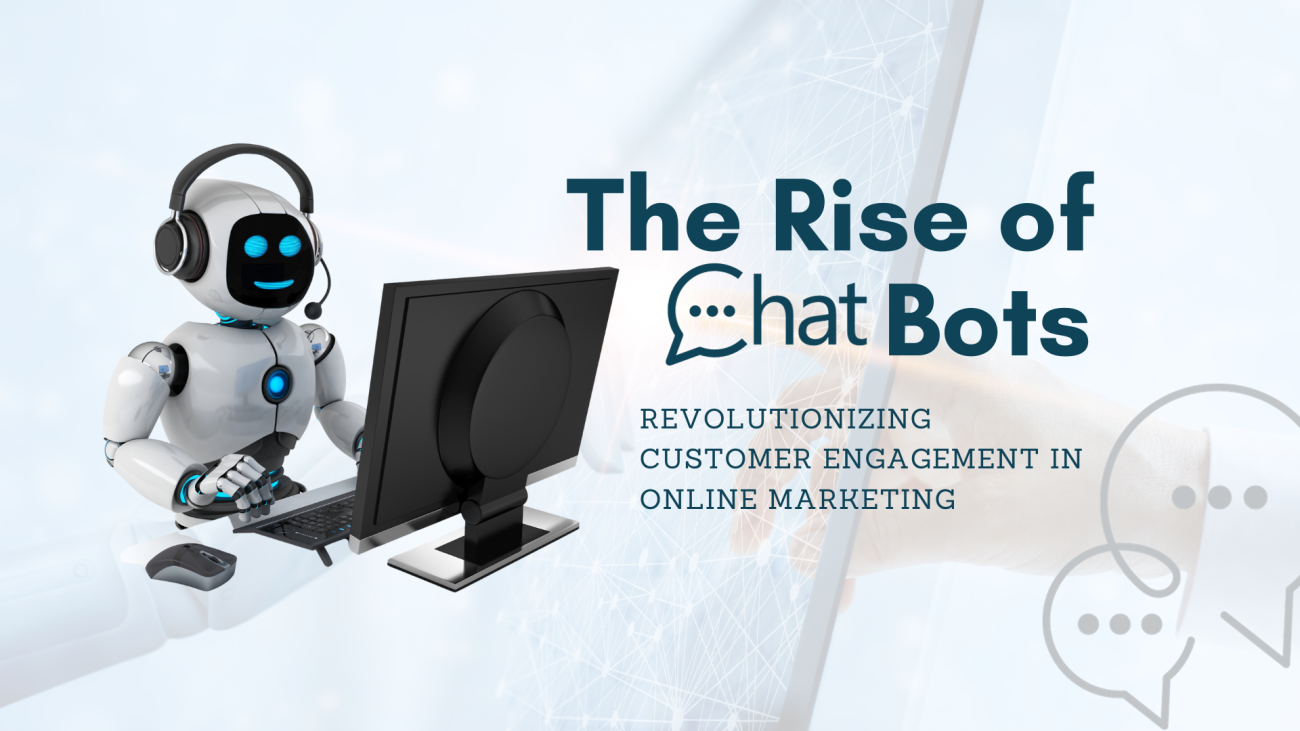Introduction:
We are all aware of the technological advancements in today’s world that are making day-to-day tasks more manageable for us, one of which is the rise of Chatbots. Powered by AI software, chatbots, also called conversational robots, are hugely important to the online marketing industry.
Due to their super fast learning capabilities and 24/7 availability, Chatbots are helping brands rebuild how they interact with customers. In today’s modern world, where effective communication and time management are essential, Chatbots help us fulfill these factors with their advanced features.
Chatbots are of different types; brands can use chatbots that follow simple rule-based systems with a set of defined instructions ranging from advanced systems that can learn and improve from customer interactions with time, providing us with valuable and personalized information.
As we all know, one of the most critical factors that signifies the growth of an organization is having an excellent online presence, serving your customers spontaneously, and having good engagement with your potential and existing customers. But handling too many clients can be difficult, right? Here’s where Chatbot comes to the rescue.
This article will discuss the importance of Chatbots and customer engagement in online marketing.
Definition and evolution:
Chatbot marketing uses computer programs to automate conversations with prospects and consumers on your website or app to generate sales.
Basic Chatbot:
This is the very first Chatbot, which was introduced in the year 1966. Today, this chatbox is still being used by a few organizations. They lack NLP, so they work with predefined questions and target keywords to which they can give solutions based on user interactions.
Conversational agents:
The introduction to advanced machine language (ML) paved the way for this to come to use in 2010. Conversational agents are advanced compared to the previous type. With the help of NLP and ML, they can learn from previous conversations and perform voice- and text-based tasks. They can also answer your customer’s questions more accurately than the primary chatbot type.
Generative AI Chatbots:
This Chatbot came into existence with the advancement of Transformer neural networks and large language models (LLMs). Jasper AI, Chat GPT, and Bard are Generative AI Chatbots. Advancements in ML and NLP led to the development of this Chatbot, which can help them understand and process customer interactions more efficiently based on their past interactions.
Many help desk and customer support use this Chatbot to curate emails according to customer preferences. Chatbots are generally very helpful, but this type of Chatbot has been helping brands get innovative and more personalized with how they connect with their clients.
Key role in Customer Engagement:
We all know engaging with your customers has been essential since traditional advertising days. However, digital marketing widely differs from conventional advertising methods.
One of the most important strategies is to gain customer engagement in online marketing platforms. Does Chatbot fulfill that criterion? Let us have a look.
Let’s assume you buy a makeup product from an online website. You later face issues with the product you purchased or would like to return the product and repurchase a new one. You can’t get them when you try to contact the customer executive due to the unavailability of time slots. Isn’t it frustrating from a customer perspective?
On the other hand, it can be challenging for brands to get in touch with their customers as soon as they receive a complaint because sometimes brands may have to answer many customer queries.
Here’s where the Chatbot comes to the rescue.
With the help of the Chatbot as a customer, you can get instant customized replies according to your interaction; the Chatbot will communicate with you. You can get instant recommendations and feedback from other customers on the products you are looking to purchase. You can also get help from the Chatbot with troubleshooting errors you have been facing while on the website.
Installing precisely detailed information is one of the best ways to gain customer engagement in any online marketplace. Additionally, it’s a plus since generative Chatbots can have human-like interactions, which makes the conversation even better.
Benefits of chatbots in online marketing:
We all know chatbots are very helpful for all of us, whether you are a student, an employee, or an employer. We have listed the three most essential benefits of chatbots in online marketing.
With the advancement of technology in NLP and ML, chatbots can adapt how they communicate with each customer according to their interactions, making it more personalized and easier.
Cost-effectiveness:
Business can save their cost by hiring more employees for customer support. Providing solutions to multiple customers accurately throughout the day can be a hectic task for human beings. This can be eliminated with the help of Chatbots.
Scalability:
We can all admit that answering precisely and quickly can be very difficult. Chatbots provide flexibility and scalability to brands by operating quickly and efficiently with the growing customer base.
Language:
Nowadays, users can communicate with Chatbots in their preferred language, breaking the communication barrier. During the beginning of the conversation, users should select their desired language to proceed further, and Chatbot will communicate via text or voice based on users’ preferences.
24/7 customer support:
People often face issues related to waiting time, globally differing time zones, and fast replies at all times. With the help of Chatbots, we can eliminate all these issues.
They provide 24/7 support, and with their help, customers get instant solutions and customized interactions with the chatbots based on their conversations. Advanced chatbots like Generative can adapt and learn more about client interactions with the help of NLP, the leading technology behind it.
Brands can reply to consumers spontaneously, which can be a hectic manual task. Customers worldwide can reach out anytime according to their preferred timings, and Chatbot handles it all, providing 24/7 customer support.
Personalization and experience:
Customers may need help with various issues when they are purchasing online. It could be related to finding recommendations from the items available on your website, troubleshooting a problem, or simply requiring more information about a specific product.
Using the analysis techniques based on a client’s browsing history, previous purchases, interactions, and provided feedback, Chatbot adapts and solves the user query in no time.
Chatbots also interact using the consumers’ names, helping them feel more connected to the brand.
Lead generation and data collection:
Lead-generation Chatbots are highly efficient in holding fluent conversations, enabling the customers to stay connected without leaving the site. We know that the conversational approach is constructive when it comes to understanding customers’ requirements; this can be achieved with the help of lead-generation chatbots.
They offer many flexible options through which the customers can navigate and select their desired choices, which will help the Chatbot collect valuable customer data. Through the gathered information from the visitors, the marketing team can approach their prospective and potential customers, create more strategies that will help them achieve more sales, and recognize areas that require more improvement.
With the help of lead-generation chatbots, your website visitors can also be converted into customers.
Social media integration:
As we all know, social media is vital in the e-commerce market. Brands on various social media platforms like Instagram, FaceBook, and YouTube have used chatbots. Integrating social media has its benefits, such as:
-
- Chatbots send live updates/notifications to your customers.
- It is more straightforward to connect with more clients from different social media platforms
- Builds community
- Creates social media campaigns that are creative and attractive
- Users can easily purchase through social media platforms
- Targets trends, curates creative content, and schedules posts, making it easier for the social media team
Analytics and insights:
Last, we cannot wrap the blog without discussing this critical factor: Chatbot’s Analytics and Insights.
Yes, chatbots can be very beneficial to the sales and marketing team because they collect user data and essential information from the customer using an interactive conversational method. Every time a customer reaches out, the Chatbot gathers information such as their name, products they are interested in, geographic location, etc.
In the analytics and insights section, you’ll also see customer ratings based on their satisfaction, feedback, the interactive flow of the conversation, the frequency of visitors, and gender.
69% of consumers were satisfied with their last interaction with a chatbot, with 21% remaining neutral and 10% unsatisfied.
Some brands develop a predefined set of questions that will be asked at the end of each conversation. Users have to choose and click their answers from the list of questions or options that appear.
Marketers and sales teams can identify and plot strategies with the data collected from this section.
Challenges, ethics, and future trends:
Although chatbots have significantly grown over the past few years, one of the most important abilities it lacks is having a human-like conversation, which is one of the biggest challenges.
Don’t get us wrong, Chatbots have been advancing with the help of new technologies and advancements. It’s still growing and has yet to fulfill its main requirement: to converse with a consumer, a human being. But we must admit that Chatbot’s latest version is still better than the basic one.
Now let’s discuss ethics; in the previous section, we discussed Analytics and Insights, which make it clear that Chatbot stores your data, such as interactions, personal information, and feedback, yesterday. Although this data is essential for the brand, customers should know where it will be stored.
A pop-up box should appear, stating that their data will be collected before they interact with the chatbox. This way, they can either choose to proceed further or not. This transparency is essential between a brand and its consumers, especially in this generation where privacy plays an important role.
Chatbot is developing day by day, and it’s still in the learning and growing phase. Innovations should be introduced, and with the help of NLP, chatbots are already getting better at understanding complex information. 2024 will have chatbots better at initiating conversations more naturally with even better adaptability.




